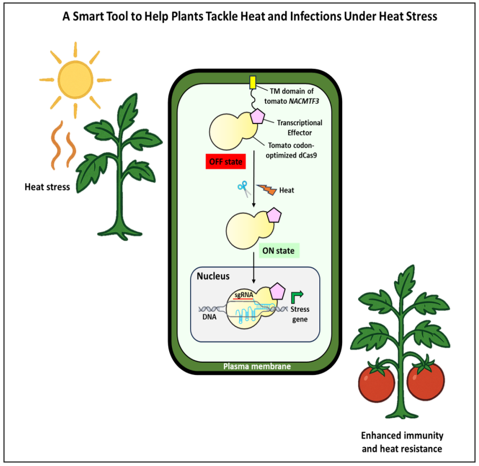Indian Scientists Develop Smart CRISPR-Based Switch to Boost Plant Resilience
Using a modified CRISPR-based mechanism, the team led by Prof. Pallob Kundu has developed a stress-activated gene switch that empowers plants to survive extreme heat and microbial attacks.

- Country:
- India
In a groundbreaking development that could revolutionize climate-resilient agriculture, a team of scientists at the Bose Institute, an autonomous institute under the Department of Science and Technology (DST), has engineered a smart molecular tool that enables plants to defend themselves only when under threat—saving energy and increasing productivity.
Using a modified CRISPR-based mechanism, the team led by Prof. Pallob Kundu has developed a stress-activated gene switch that empowers plants to survive extreme heat and microbial attacks. This innovation could be a game-changer for farmers worldwide struggling with climate variability, pathogen outbreaks, and reduced crop yields.
CRISPR Reimagined: Turning Genes On Without Cutting DNA
CRISPR is widely known for its gene-editing prowess—cutting DNA to make permanent changes. But this team took a different approach. Instead of cutting, they used “dead” Cas9 (dCas9), a version of the CRISPR protein that doesn't cut DNA.
Rather than deleting or rewriting the genetic code, dCas9 acts like a programmable switch, turning specific genes on or off. What makes this tool "smart" is its ability to stay inactive until the plant is stressed—either by heat or infection. Once danger strikes, the system automatically activates genes that help the plant fight back.
Tomato-Inspired Engineering: A Natural Thermo Switch
To make this system stress-responsive, the researchers borrowed a part of the NACMTF3 protein from tomatoes—specifically, the transmembrane (TM) domain, which acts like a tether. Under normal conditions, this TM domain keeps the dCas9 switch outside the nucleus, where the plant’s genetic control center resides.
But under heat stress or microbial attack, the tether loosens. The switch enters the nucleus and triggers specific genes that help the plant respond effectively to the adverse conditions.
This smart gatekeeping mechanism allows the plant to conserve energy when not under threat, but react swiftly and strongly when danger arrives.
Tested on Solanaceous Crops: Tomatoes, Potatoes, and Tobacco
The research team tested the system on tomatoes, potatoes, and tobacco—all belonging to the solanaceous plant family, known for their economic and nutritional importance.
One of the standout tests was on tomato plants infected with the bacterial pathogen Pseudomonas syringae, especially dangerous during heatwaves when the plant's immune system is compromised.
To counter this, the scientists activated two critical defense genes—CBP60g and SARD1—only when the plants faced stress. This targeted activation strengthened the plant’s immune response at the right time, significantly improving survival rates and reducing disease severity.
Beating the Heat: Activating “Heat Helper” Genes
In a separate test, the team targeted heat stress response genes—NAC2 and HSFA6b—which are crucial for helping the plant withstand high temperatures. These genes were also activated only during heat stress, enabling the plants to:
-
Retain water more effectively
-
Stay greener for longer
-
Maintain overall health under extreme temperature conditions
This method ensures that the plant does not expend unnecessary energy by keeping stress-response genes on all the time. Instead, it activates them only when needed, akin to a built-in emergency response system.
Published in Prestigious Journal, Poised for Broad Impact
The study, published in the International Journal of Biological Macromolecules, signals a promising future for climate-smart agriculture. The researchers envision that the same mechanism can be extended beyond tomatoes and potatoes to eggplants, chillies, bell peppers, and other crops crucial to global food security.
As climate change continues to present unpredictable and harsh conditions for agriculture—intensifying heatwaves, erratic rainfall, and new disease pressures—tools like this offer hope for sustaining food production.
Toward a New Era of Smart Farming
This development marks a significant advancement in plant synthetic biology and sustainable farming. By combining indigenous plant traits with genetic engineering precision, the tool provides a smart, adaptive system that could be scaled across various crops and geographies.
“This switch doesn’t just help the plant survive—it helps it thrive by choosing when to act,” said Prof. Pallob Kundu. “It’s a step toward intelligent farming systems that are energy-efficient and self-regulating.”
Such tools could also integrate with precision agriculture platforms, IoT-based crop monitoring, and next-generation biotechnology, positioning India and the world on a stronger footing against the looming climate crisis.









